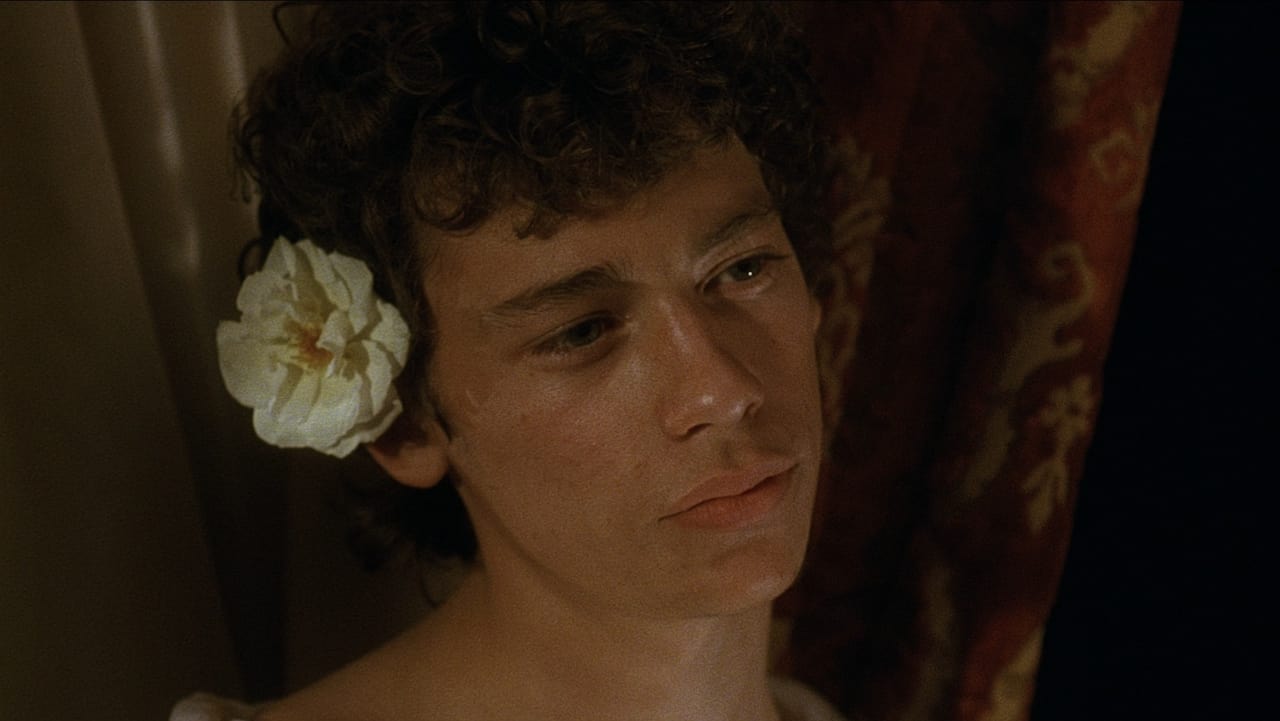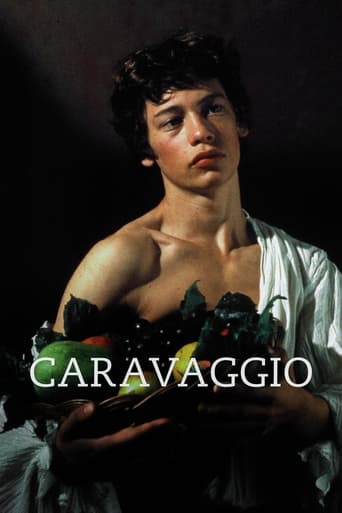



It's entirely possible that sending the audience out feeling lousy was intentional
View MoreGood films always raise compelling questions, whether the format is fiction or documentary fact.
View MoreStrong acting helps the film overcome an uncertain premise and create characters that hold our attention absolutely.
View MoreThere are moments that feel comical, some horrific, and some downright inspiring but the tonal shifts hardly matter as the end results come to a film that's perfect for this time.
View MoreCaravaggio (1986)It's easy to be frustrated by movie that seems by its title to be one thing but is so clearly something else. This is no bio-pic of the great artist. It doesn't even create (to me) a more abstract sense of what it might have meant to be such an artist, or to be creative and tormented and a scrappy, sometimes ill man. Instead it's a movie that uses some themes, and some paintings, of Caravaggio and builds a completely invented (to my knowledge) story line. For one thing, it's set in some fairly recent time--the 1920s or 30s, perhaps? And it's highly highly British, which is no flaw, but it feels part of a 1980s London underground in the expressions and vocabulary. If you can open up to all that, you've made a first step. If you can't, forget it. Run to another version (like the terrific new Italian one from 2007).The second step is key, too, however, for many of you. This is an overtly homo-erotic, or at least homosexually charged fantasy. It has no overt sex (though there is lots of kissing all around) and it does includes some female actors (including a fabulous Tilda Swinton), but there are lots of "pretty boy" scenes and a sensibility that is just frankly different than the usual film world mainstream.That's a great thing. That doesn't however make the movie completely work. It's worth watching if you are prepared for its tone, and it's brilliant in some sense, utterly original, a kind of high production value, high culture flip side to the films of Andy Warhol (if that makes any sense at all). There are excesses in violence, bloody, death, love, corporal pleasure and corporal torture--but these are exactly what the 1980s were all about. Think of Robert Mapplethorpe. It's not my own world at all, but I found it a kind of thrill to see made so rich and colorful, so unexpected every turn. And so photographically beautiful. It is at times disturbing and moving, but mostly it is pretty and fascinating. It lacks a more usual structure, but you get used to that and learn to like it.
View MoreI really hated this film. I have watched many experimental, ambitious, and complex movies that demand much thought and attention from the viewer, but this one was an inexcusable exercise in self-indulgence by the filmmaker. The voice overs contained language which was heartbreakingly beautiful and I wished that more of that intelligence and beauty had been transmitted to the rest of the movie. Instead we get a tawdry pastiche of soft-core pornography which becomes so tedious that, when another perfect male form was displayed I became numb and angry. One would imagine that Caravvagio created his work in a vacuum, and that his art was a product of his violent and transgressive nature only. Having studied art, and being an artist myself, I was looking for some insight into this fascinating man and his revolutionary work. The scenes of him painting were unconvincing and the paintings in progress looked like amateur attempts in figure-drawing. I was able to wrest some meaning from Caravaggio, but that occurred early on and the only reason I kept watching it was the thought that it would kick in and start making some overarching sense. Watching this would lead one to believe that Renaissance Italy was populated mostly by homosexuals with a strong predilection for violent sex, and the clergy who exploited them for their private titillation. "Caravvagio" managed to demean the people it was trying to celebrate, oversimplify a complex individual, and bore and confuse its audience. Only recommended for a committed student of Jarman's work, as the "auteur" was obviously more interested in himself than in the subject.
View MoreQuite simply unlike any other biographical film you will ever see, Derek Jarman's acclaimed production of Caravaggio (1986) is a lovingly constructed, highly personal cross-reference of tormented sixteenth century genius, twentieth century iconography and a somewhat satire on the shallowness of the burgeoning eighties' art scene of which Jarman was very much part of. Exploring Caravaggio's life through his work, the film distinctively merges fact, fiction, legend and imagination in a bold and confident approach that will probably leave serious art enthusiasts and casual viewers outraged by the complete disregard for accurate, historical storytelling.Shot with a typically avant-garde approach, director/writer Jarman doesn't so much fashion a biography of the artist, but rather, creates a personal reflection of the man using intimate characteristics that appeal to his film-making sensibilities. This makes Caravaggio more of an interpretation of the filmmaker than the artist himself; somewhat self-indulgently focusing on Caravaggio's struggle with bisexuality, perfectionism and wanton obsession; perhaps even glossing over the more intricate workings of the character, for instance, his own passion for art and his battles with the various religious and creative constraints of the period.It's a shame some of these ideas aren't further elaborated upon, because, at its heart, Caravaggio is really an exceptional film. As I commented earlier, it's perhaps unlike any other film you will ever see; an iconoclastic vision with a cinematic imagination that knows no bounds. Caravaggio is a film in which a 16th century setting gives way to the various anachronisms of passing trains, tuxedos, motorbikes, typewriters and chic nightclub settings. It is a film in which every frame is rendered in reference to the artist's work, composed with rich, shadowy colours that bring to mind the contrast between fresh and rotting fruit, and an unrivalled interplay between sound and production design that is reminiscent in its intense savagery of two dogs angrily ripping each other to pieces.There is no other 'based on fact film' that has demonstrated such a wild and evocative recreation of real-life hysteria and events, with the possible exception of Peter Jackson's masterful Heavenly Creatures (1994) or even some of Jarman's subsequent projects like Edward II (1991) and Wittgenstein (1994). With a cast of now very well known faces, such as Nigel Terry, Sean Bean, Tilda Swinton, Michael Gough, Dexter Fletcher and Robbie Coltrane - not to mention some of the most beautiful photography ever committed to film - Caravaggio represents an impressive and enjoyable combination of art and cinema that is now, twenty years on, ripe for rediscovery.
View MoreFew moviegoers would know that the real Caravaggio was a convicted criminal and even by today's standards, a hell raiser. Rome's police records list fourteen citations in six years, from public nuisance to several violent assaults. In May of 1606 he murdered a friend, one Ranuccio Tomassoni in a sword fight. Added to these lurid details, his sexual interests show that he freely drifted from the Vatican's ordained model. This makes Caravaggio an interesting person, but a highly complex candidate for a biographic investigation on film.While Derek Jarman's film captures (with delightful conceit) many of the surface details of Caravaggio's life, it's a work of startling genius because it succeeds on a far more profound level. Jarman tells the story of Caravaggio rather like Caravaggio would paint, infusing it (effortlessly) with the central themes of his life's deepest convictions, creating a portrait which reflects the subject and the artist with equal relevance. What's more, many of the same themes that have been identified with both artists - sexuality, transcendence, violence, censorship, politics (religious/sexual) and the tumultuous source of creative identity are present in both men. It works as very few films do. This is also an unusually accessible film for Derek Jarman. The performances are entertaining and it's filmed with astounding beauty and simplicity. This film is a masterpiece.However, because of it's homosexual themes and personal tone, "Caravaggio" is likely to be appreciated only by those viewers who weary of film as simple diversion and long for something more challenging. This is a powerful artistic statement, but it flew under the radar during a decade of British film-making where "Gandhi", "Chariots of Fire" and "A Room With A View" represented the best of what was being made. While those films are great in their way, this film value is greater in terms of bravura and personal expression. See it if you can.
View More